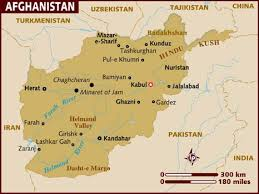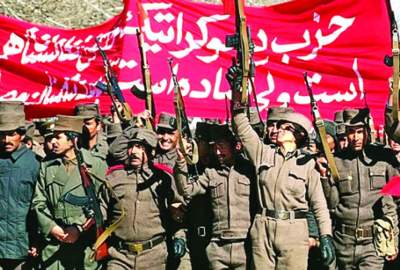While millions of Afghans seek asylum outside their native country, the world’s unluckiest refugees might be the ones moving in the opposite direction — with no choice but to flee their homes for war-torn Afghanistan.
One of them is Abdul Hamid, who escaped Iraq after the U.S.-led invasion there, with no idea he would eventually land in another American war zone, part of a small community of refugees on an unlikely quest for Afghan citizenship.
There are now about 70 men and women like him here — dissidents, victims of religious political refugees from disparate parts of the world. Their arrival has prompted raised eyebrows, and sometimes laughter.
“‘You’re seeking refuge here?’ people ask me,” Hamid said. “‘Are you crazy?’”
The government, unaccustomed to dealing with refugees, placed some of them in a transitional public guesthouse in Kabul where the other residents are Afghans who had fled to Europe but were deported. Now, the men seeking to escape Afghanistan live among the ones trying desperately to stay.
Given its proximity to historically troubled nations and a slew of oppressed minority groups, Afghanistan has long been considered a convenient place to seek temporary refuge. Pakistanis and Iranians did so for years. During Tajikistan’s civil war, 90,000 Tajiks poured into northern Afghanistan.
But almost without fail, those refugees left. The situation improved in their native countries, and it worsened here. The 70 people who remain are among the world’s unluckiest asylum seekers, out of other options.
Among them are Kashmiri independence fighters, Chinese Muslims and former Tajik rebels. Most never expect to return home, but they have not been granted permission to stay in Afghanistan. Some have been given temporary housing in the austere dormitory run by the Ministry of Refugees and Repatriation. Others rent apartments in Kabul, Mazar-e Sharif and Herat, donning Afghan clothes and trying to blend in.
Back in Iraq’s Kurdistan region, Hamid was one of Saddam Hussein’s few supporters. A public school teacher, he saw the regime as a source of stability, despite its flaws. At least he had a job under Hussein, he thought.
But the U.S.-led invasion meant that his old alliances would be held against him. Members of his family had been killed, and in 2005, joining 42,000 other Iraqis, he left for Iran.
Hamid found himself shuttled between Iranian refugee camps and prisons for about five years. He decided again that he had to flee, but he had no passport or identification card. A smuggler offered to take him to Afghanistan. Out of desperation, he said yes.(Washington Post)
One of them is Abdul Hamid, who escaped Iraq after the U.S.-led invasion there, with no idea he would eventually land in another American war zone, part of a small community of refugees on an unlikely quest for Afghan citizenship.
There are now about 70 men and women like him here — dissidents, victims of religious political refugees from disparate parts of the world. Their arrival has prompted raised eyebrows, and sometimes laughter.
“‘You’re seeking refuge here?’ people ask me,” Hamid said. “‘Are you crazy?’”
The government, unaccustomed to dealing with refugees, placed some of them in a transitional public guesthouse in Kabul where the other residents are Afghans who had fled to Europe but were deported. Now, the men seeking to escape Afghanistan live among the ones trying desperately to stay.
Given its proximity to historically troubled nations and a slew of oppressed minority groups, Afghanistan has long been considered a convenient place to seek temporary refuge. Pakistanis and Iranians did so for years. During Tajikistan’s civil war, 90,000 Tajiks poured into northern Afghanistan.
But almost without fail, those refugees left. The situation improved in their native countries, and it worsened here. The 70 people who remain are among the world’s unluckiest asylum seekers, out of other options.
Among them are Kashmiri independence fighters, Chinese Muslims and former Tajik rebels. Most never expect to return home, but they have not been granted permission to stay in Afghanistan. Some have been given temporary housing in the austere dormitory run by the Ministry of Refugees and Repatriation. Others rent apartments in Kabul, Mazar-e Sharif and Herat, donning Afghan clothes and trying to blend in.
Back in Iraq’s Kurdistan region, Hamid was one of Saddam Hussein’s few supporters. A public school teacher, he saw the regime as a source of stability, despite its flaws. At least he had a job under Hussein, he thought.
But the U.S.-led invasion meant that his old alliances would be held against him. Members of his family had been killed, and in 2005, joining 42,000 other Iraqis, he left for Iran.
Hamid found himself shuttled between Iranian refugee camps and prisons for about five years. He decided again that he had to flee, but he had no passport or identification card. A smuggler offered to take him to Afghanistan. Out of desperation, he said yes.(Washington Post)
Source : Afghan Voice Agency(AVA), International Service







